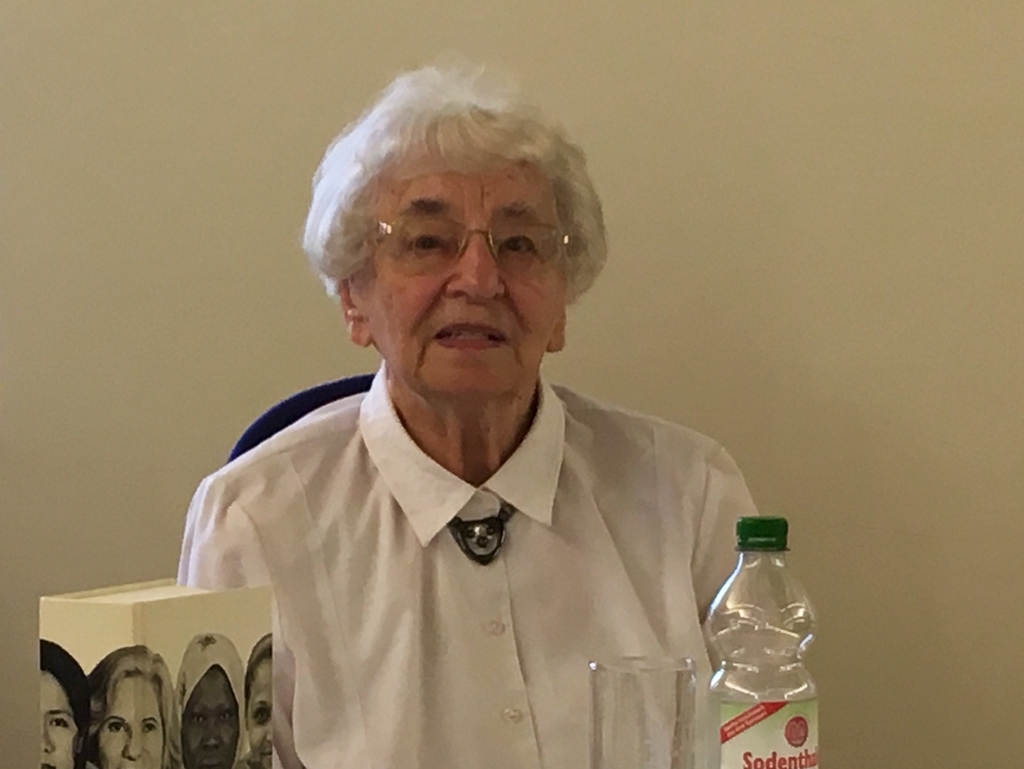About us
PeaceWomen Across the Globe is an internationally active feminist peace organisation based in Bern that supports women in contexts affected by armed conflict in their diverse efforts to build lasting peace.


PeaceWoman Ruth Weiss has dedicated her life to peace and tolerance: as a journalist and anti-apartheid activist in South Africa and as a speaker and author in the fight against anti-Semitism and any form of intolerance and agitation against a faith community. What lessons does she draw from her full life for peacebuilding?
As a child, Ruth Weiss fled Nazi oppression of the Jews in pre-war Germany and settled in South Africa. There she fought apartheid as a journalist and was declared a persona non-grata. In Harare, she co-founded the Zimbabwe Institute for Southern Africa that played an important role in paving the way for the end of apartheid. In 2005, she was nominated as one of 1000 PeaceWomen for the Nobel Peace Prize.
Your biography is as remarkable as your longevity. Of all the experiences you have had in the course of your long and active life, can you point to one defining moment or experience that shaped the PeaceWoman you became and are today?
Peace is the operative word. I abhor violence of every kind, even a shouting match. And no, there is no defining moment as such to which I can point and say: that is when I decided to speak/write/act against everything I consider “nasty” such as prejudice. That in itself harbours intolerance, racism, sexism, and of course anti-Semitism or any anti-any-religion sentiment.
My commitment to reject such views just happened – basically because of my experience as a child in Nazi Germany. I always say that it made me leave childhood behind too early. I experienced the fear of adults around me. I remember the horror when I learned of the Holocaust.
You fled to South Africa in 1936. In 1948 apartheid became an institutionalised system of racial segregation.
In South Africa I was instantly confronted again with injustice, prejudice and fear, this time against the majority of the population, which seemed incredible. I would say that I was fortunate that I met people within the emigrant group who shared my reaction to the social system in which we found ourselves.
While living in Harare from 1982-1992, you were part of the team that built the Zimbabwe Institute for Southern Africa (ZISA) that organised meetings between Afrikaners and delegations of the anti-apartheid movement.
We organised meetings between white and black South Africans, between English- and Afrikaans-speaking South Africans and with representatives of all South African liberation parties. The meetings were by no means always with delegations. Depending on what ZISA was asked to set up, there were conferences, workshops, for example between lawyers or economists, as well as meetings between individuals.
ZISA is credited with playing a key role in bringing apartheid to end.
I’m not sure that ZISA played a key role in ending apartheid but, yes, I do think it was important in that it brought people together who had learned to hate each other. By so doing, understanding was furthered and friendships forged across the barriers.
What role did women play in these meetings organised by ZISA?
One of the major conferences ZISA organised was between 50 members of the ANC Women’s League and a delegation of majority Afrikaans-speaking women organised by IDASA [Institute for Democratic Alternatives in South Africa, the progressive think-tank]. The Women’s League of Zimbabwe’s Zanu PF were also invited. The conference was opened by Sally Mugabe, Robert Mugabe’s first wife. When she arrived, she said, “Ruth, I didn’t get my speech!” I thought she had brought it with her. So I had to write it in a maddening rush, in something under ten minutes. But it seemed to go down OK. It was the only occasion when I was a participant. I was deeply moved by the reaction of the white women. None of them had ever had any contact with black women on an eye-to-eye level. It was a great shock to many of them. I found one woman weeping in the ladies’ room and when I asked what was wrong, she said: “I didn’t know…we never knew…such wonderful women. What wasted years…”
During the course of your life as a journalist and activist in southern Africa you met Robert Mugabe and Nelson Mandela. Mugabe, who became president of the newly independent Zimbabwe in 1980, began as a beacon of hope for peace and democracy, but later ran an authoritarian and oppressive regime. Nelson Mandela, whom you met several times, is revered past his death as the icon of the anti-apartheid struggle and post-apartheid reconciliation. What lessons for peacebuilding can you draw from these two men?
Both men were subjected to the humiliation meted out by racism, yet their reaction was different because of their temperament and background. Nelson Mandela grew up as a member of a royal family, with an awareness of his leadership. He rose to a different kind of leadership after his arrival in Johannesburg, where he instantly joined the leadership of the African National Congress. He had little doubt about his self-confidence and the sense of being born to lead. His role as an example to others, which he displayed during his imprisonment and after his release, was therefore thrust upon him early in his life. His concern was the welfare of the people, for their sakes he was prepared to compromise with the enemy.
And Robert Mugabe?
Robert Mugabe’s background was totally different. His non-Zimbabwean father had left the family, his mother was forced to turn to someone else for protection. Robert adopted this man’s surname of Mugabe. He was a loner, devoted to his studies and career. He eschewed politics, even at the University of Fort Hare in South Africa [that offered higher education to black students starting in 1916]. It was only when he returned from Ghana, where he had been teaching, that he made a hit with a speech at a major rally. The Zimbabwean independence leaders begged him to stay. Unlike Mandela, Mugabe had come to hate all whites. He was focused only on his own interests and not those of the people. The first years after Zimbabwe’s independence in 1980 he spent securing his leadership position by removing rivals. He tolerated no one beside himself. Mandela did not have that problem, either by temperament or experience: he was the leader. He could step aside as president in 1999 and still be number 1.
At the recent meeting of the international board of PeaceWomen Across the Globe the members discussed the definition of "feminist peace work". How would you define the term?
I would say that it is “peace through doing”, beginning with the role of women within the family and starting with grass-root projects rather than focusing on the big political solution.
What is its relevance today?
The same that it has always been. Feminist PeaceWomen raise healthy children who are taught to care for others as well as themselves, who seek personal fulfilment within given possibilities, thus avoiding envy or greed, which leads to violence.
You are a teacher and a public speaker against racism and for tolerance. How do you teach tolerance and respect in a way that leads to meaningful and lasting change?
By showing how satisfactory it is when such tolerance and respect is offered or given. Dr Frederick van Zyl Slabbert, founder of IDASA, proved that. He had led the official opposition in Parliament but resigned in 1986. IDASA was founded a year later and as its head he initiated dialogue between black and white South Africans and with the then-banned African National Congress. He was the first to organise a meeting on an equal footing between members of the anti-apartheid movement and leading, mainly Afrikaner, politicians, academics and business people in Dakar, Senegal. Each group and each delegate was prepared to listen to the other’s point of view. Each side showed tolerance and respect for the other. That was also the case at the meetings at ZISA, which grew out of these encounters organised by IDASA.
Did women participate in the Dakar Conference?
I was told by Barbara Masekela, who many years later became South Africa’s ambassador to the USA, that she made lifelong friends during the Dakar meeting. She also told me that there was a good number of women in the 22-head ANC delegation, but no more than one or two in the 61-head IDASA delegation, about half of which consisted of academics, artists, journalists, writers and directors. This lack of women in the IDASA delegation did not go unmentioned.
You have been speaking to young people for a number of years. How have the questions young people ask you changed over the years?
They changed with the general atmosphere. I remember hostile questions about Israel. More recently this was not an issue, despite talk of the boycott against Israel. Instead, I am asked about the German right-wing party AfD [Alternative für Deutschland, Alternative for Germany] and my feelings as a Jewess about Germany. Often teachers ask what advice I’d give young people and my answer is always the same: don’t look the other way when you witness any injustice. Stand up if you think it is wrong. Incidentally, at a recent speaking engagement I was asked that I would have said to Hitler had I met him. I couldn’t think of anything clever, so I said: «Well, I was 12 when I left Germany, so I’d have said as a 12 year old: ‘What are you doing in this country where I was born, but you are not from?’»
For which of your many achievements would you like to be remembered?
That I cared about others enough to listen.
In this video on our Facebook page, Ruth speaks about the role of women in the struggle against apartheid (2'30).
(The Interview was conducted in July 2019)